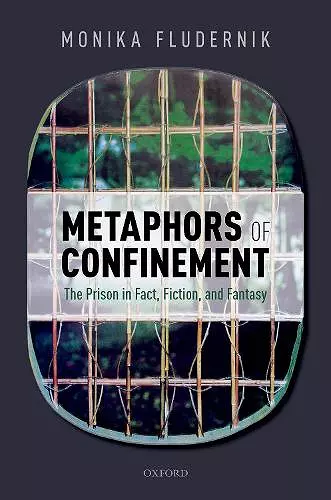Metaphors of Confinement
The Prison in Fact, Fiction, and Fantasy
Format:Hardback
Publisher:Oxford University Press
Published:13th Aug '19
Currently unavailable, and unfortunately no date known when it will be back

Metaphors of Confinement: The Prison in Fact, Fiction, and Fantasy offers a historical survey of imaginings of the prison as expressed in carceral metaphors in a range of texts about imprisonment from Antiquity to the present as well as non-penal situations described as confining or restrictive. These imaginings coalesce into a 'carceral imaginary' that determines the way we think about prisons, just as social debates about punishment and criminals feed into the way carceral imaginary develops over time. Examining not only English-language prose fiction but also poetry and drama from the Middle Ages to postcolonial, particularly African, literature, the book juxtaposes literary and non-literary contexts and contrasts fictional and nonfictional representations of (im)prison(ment) and discussions about the prison as institution and experiential reality. It comments on present-day trends of punitivity and foregrounds the ethical dimensions of penal punishment. The main argument concerns the continuity of carceral metaphors through the centuries despite historical developments that included major shifts in policy (such as the invention of the penitentiary). The study looks at selected carceral metaphors, often from two complementary perspectives, such as the home as prison or the prison as home, or the factory as prison and the prison as factory. The case studies present particularly relevant genres and texts that employ these metaphors, often from a historical perspective that analyses development through different periods.
...it is a valuable resource to anyone aiming to explore the use of metaphors of confinement at a specific point in time with a view 280 Reviews to the cultural work they perform. * Cornelia Wächter, Technische Universität Dresden, De Gruyter *
Monika Fludernik's ambitious Metaphors of Confinement looks in at least three directions at once, to take in prisons in literature (mainly in English), including detailed analysis of lesser-known novels ... the autobiographies and fictions of imprisoned writers; and the history of penal institutions and thinking ... Fludernik's imprisoned writers are either religious or political, and their writings are brave acts. * Jenny Hartley, Times Literary Supplement *
Fludernik's real interest is in the ambivalence of certain recurring metaphorical topoi, and in bringing this ambivalence to the surface in close readings of texts. This Fludernik does with a rigor, thoroughness, and range that is truly Herculean. It is difficult to imagine anyone, ever, having the capacity or energy to produce a richer, better-evidenced, more nuanced history of the carceral imaginary in English literature than Fludernik has done. * Maksymilian Del Mar, Style *
... comprehensive and insightful study of the "carceral" in literature and of its sources in human experience, from medieval dungeons to a variety of less or more disinfected modern prisons. * Leona Toker, Partial Answers: Journal of Literature and the History of Ideas *
Metaphors of Confinement is an important and comprehensive work that will be indispensable for those interested in literary and cultural representations of incarceration. ...Metaphors of Confinement is an integral piece of literary history and criticism and a must-cite for those interested in the intersection of English literature, law, and incarceration. * Jack Quirk, Law, Culture, and Humanities *
the culmination of decades of work by one of the world's top narratologists. Fludernik takes the reader through a fascinating, enlightening and often troubling journey through representations of literal, imagined and metaphorical prisons in literatures in English from the Middle Ages to the present day. Drawing eclectically from legal studies, literary criticism, cultural and social theory, stylistics and metaphor theory, the book reveals the many facets of literature's fascination with imprisonment over the centuries, and addresses the ethical issues associated with both literary and real-world prisons. While the book's main contribution is to the study of metaphor, many different audiences will be interested in it for different reasons, and all will marvel at the author's unique combination of towering intellect, theoretical versatility and vast scholarship. There is no doubt that this book is destined to become a classic. * Elena Semino, Lancaster University *
Metaphors of Confinement makes a significant contribution to current and ongoing debates on the ethics of imprisonment, on the role of the prison in society and in the cultural imaginary, and on the relations between law and literature from the early modern period to the present. It is a formidable piece of scholarship, wide-ranging in the scope of its research and innovative in its methodology; it is also passionate in its ethical and political commitments, and subtle and learned in its readings of a rich array of fascinating texts. Monika Fludernik's magisterial study will make its mark as an essential point of reference for any future discussion of prisons and prison literature. * Hal Gladfelder, University of Manchester *
ISBN: 9780198840909
Dimensions: 240mm x 161mm x 52mm
Weight: 1446g
842 pages